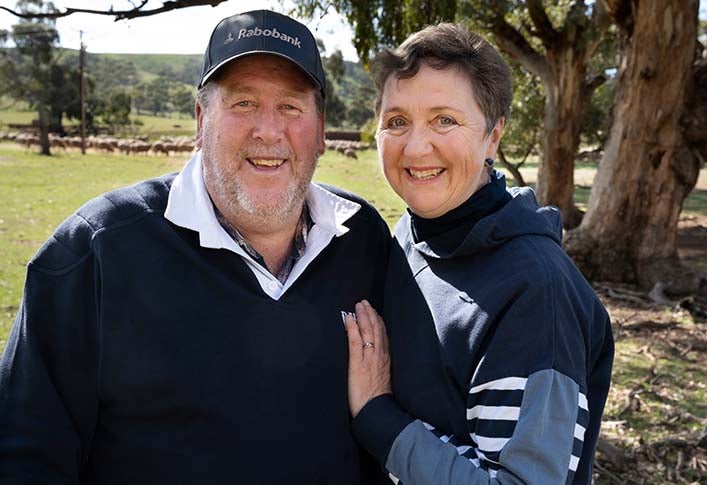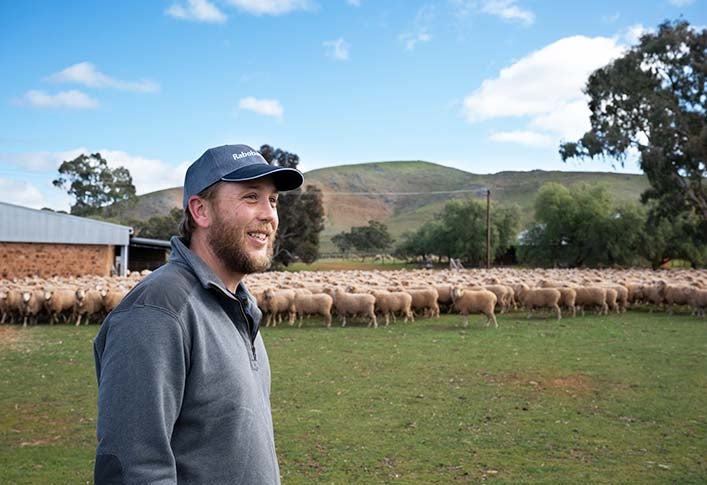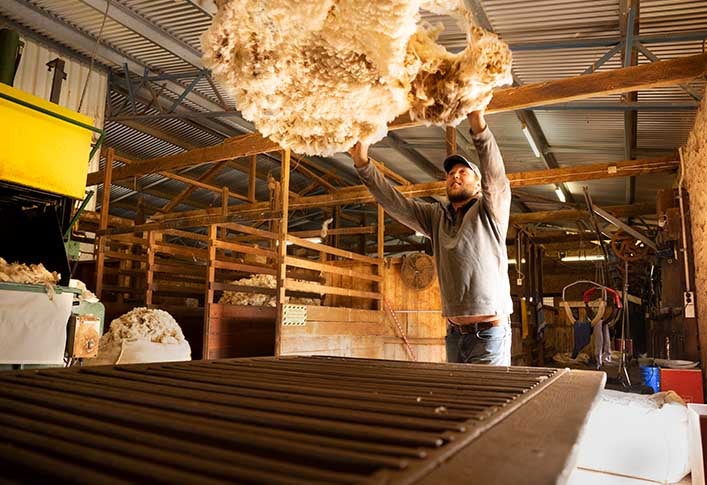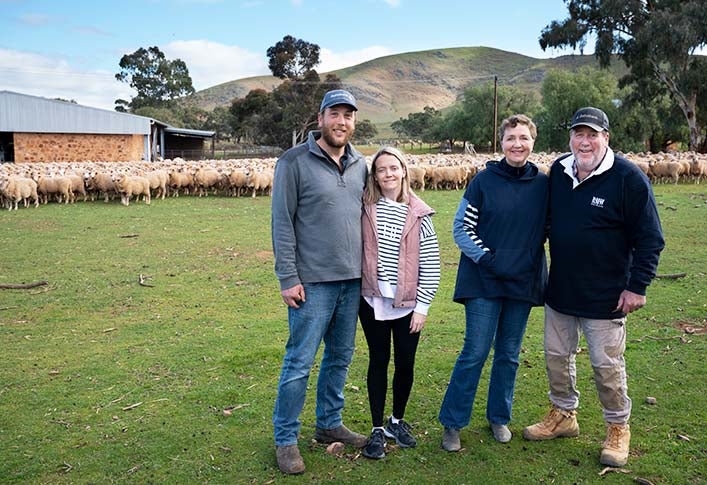Posted by on
21/12/2022
From high school sweethearts at Clare High School to proud parents and grandparents, Greg and Liz Hall have enjoyed a 42-year farming partnership, and it’s one they now happily share with the next generation.
A recent move into town has allowed for a generational change within this South Australian farming family, with their three adult children, Amy, Ben and Rob, their partners and young children, now integrally involved in the operation.
And while many farmers are notoriously hard to shift from the land, Greg reflects that this changing of the guard has been extremely positive, and that having his children continue their life’s work and a family legacy was the source of great pride.
“We’ve always appreciated the opportunities that our parents gave to us, it’s enabled us to have a good life on the land and to pass this love on to our children,” Greg says. “Family has always been our driving force and we’ve worked towards being able to give those choices to the generations to come – whatever direction they decide to take.”
A family tradition of continual growth
Greg grew up on the original family farm at Mintaro in the Clare Valley, where his grandfather began in the 1920’s as a labourer and blade-shearer; buying and paying for his first paddock in the late 1940’s.
His father, Allan, continued farming there until the 1980’s, by which time he was able to help set up his two sons and daughter to each make a living from the land.
Greg acquired 470 hectares at Mintaro, known as Peppermint Ridge, and with its reliable rainfall and high fertility, it became the backbone of a cropping and sheep enterprise, and enabled Greg to continue the tradition of buying and selling land, judiciously purchasing and selling at Everard, and later, Auburn.
By the early 2000’s Greg says it was clear that their son Rob had also inherited a strong commitment to the farm.
“Rob has a keen interest in livestock so the purchase of ‘Ulooloo’ at Hallett, thirteen years ago made sense, allowing the opportunity to focus on livestock production on an economic scale, while continuing the cropping focus at Mintaro.”
Greg explains that during this time the wool market was struggling, so their priority was for a dual-purpose breed, to expand the flock.
“We tried a number of other breeds and it didn’t work out too well, but Rob was pretty keen on the Dohne Merino for its meat and wool qualities, so that was the basis of our flock. By chance there happened to be a dispersal of a Western Australian stud, so that gave us our start in the stud game.”
The expanded sheep enterprise moved to 6000 hectares of pastoral land at ‘Ulooloo’, including the Dohne Merino Stud.
A further 600 hectares of cropping complements the grazing land.
Now Robert, together with his wife Lucy and their three children Brady, Noah and Annie, are managing the farm at ‘Ulooloo’.
With this increased workload coinciding with Greg and Liz’s desire to scale down, the recent decision by their son Ben to also return home has been a timely one.
“With Ben now home we have re-introduced cattle into the operation, recently purchasing a small herd of 35 mixed cows, and it really is exciting to have all this new energy driving the enterprise forward.”
As part of the succession plan, Amy, and her husband Graeme Wright, plus their two boys, Hamish and Angus live on the original holding at Mintaro.
In partnership with Liz and Greg they crop at Mintaro and lease a further 240 hectares of cropping land, whilst also running an agricultural contracting business.
Machinery is shared to run the two properties, which are 80kms apart, with Greg and Liz based in Burra, half-way between – perfect, they laugh, for babysitting duties and supporting the kids’ school and sport.

Dohne for versatility and gross margins
The Halls’ commercial Dohne flock now consists of 3000 breeding ewes, and they praise the breed for its versatility.
“The Dohne gives us the opportunity to sell lambs at a good price when needed, depending on the season, with the bonus of a nice wool clip.
“Being plainer, the Dohne Merinos don’t cut quite as much wool, but it’s still excellent quality,” Greg explains. “We have therefore been able to cease mulesing, which attracts a price premium.”
“This, along with their higher lambing percentages and good mothering instincts, results in a better gross margin for us.”
The Halls have now begun working towards accreditation for the Responsible Wool Standard (RWS), and believe markets in the future will demand a more ethical, humane product for both meat and wool – for which they will be well-placed to capitalise on thanks to their considered farming practices.
In addition to their commercial flock, the Ulooloo Dohne Merino Stud now includes 400 ewes, from which 100 – 150 rams are sold annually.
The family is looking at how technology can help further strengthen its flock, and limit some of the labour intensity within the enterprise.
“We’re looking to implement DNA testing to record flock progeny, and we do use electronic identification tags (eID), but not to the full potential, so there’s further opportunity for us in this space.”
“Dohne Merinos have only been in Australia for 25 years, having been imported from South Africa, and there’s so much data on how the breed has improved in that relatively short period of time, so it’s exciting to see what improvements producers can make going forward.”
Early growth rates are a breeding objective across the Halls’ stud, and they also strive for strong lamb survivability and weaning rates, reflective of good mothering.
“We pedigree our lambs the traditional way, by pairing lambs up with their mothers in the yards, and we run our stud sheep in paddock conditions the same as we do with our commercial flock, so we know they will perform in genuine paddock conditions.”
Currently, Greg said weaning rates are recorded, and lambs are again assessed at 10 months for fat, eye muscle depth, body weight, wool micron and fibre diameter and comfort factor.
“These are all basic figures we use to record our sheep genetics for the Australian Sheep Breeding Values (ASBV) Dohne index, so we can then compare our Dohnes with any other Dohne studs across Australia and see what’s working, and what we can improve.”
The Halls have also customised their shearing schedule to help support optimal wool production, shearing every eight months or so.
“We shear young sheep three times in their first two years. It helps mitigate the bad seed problems we have in this region, boosts wool production, and we’ve found sheep grow out a lot better.”
As a result, the family consistently achieves premium strength, well nourished, lower micron, deep crimped wool, free of stress-break, averaging 28 – 30 Newtons per ktex in their older sheep, and 40-50 Newtons per ktex in their younger sheep.
The ewe flock averages between 18 and 20 microns with a high comfort factor.
“Ideally we’d like to be shearing them every six months, but with the shearer shortages and dry years, it’s just not feasible.”

A mixed business to manage risk
Cropping is also a part of the Halls’ business on ‘Ulooloo’, as well as the 470 hectares on their Mintaro property, growing wheat, barley, beans, canola and more recently, trialling lentils.
“The value of the land has tripled on ‘Ulooloo’ since we bought it 13 years ago – I’m not sure it makes business sense to pay that much now, particularly for non-arable land, but it’s a double-edged sword; prices may seem scary, but our land value improves with every increase.”
Greg believes running stock and cropping is a good mix, and while sheep remain the focus on ‘Ulooloo’, he is happy to have cropping in the ratio, even given the current high input prices.
Many across the state and into NSW, the Halls included, restocking after the drought are also turning to sheep over cattle due to their affordability.
A passionate ‘sheep man’, Greg hopes that the high input costs of cropping will also encourage some farmers to reconsider the place of sheep in their overall farm plan.
“I think, as an industry, we got in just in the nick of time; there’s a generation left who still know a thing or two about sheep – it’s valuable knowledge now that there’s been a revival, and it’s exciting to be a part of it.”
Managing for productivity, and the environment
“Lock it up and leave it” is no fool-proof environmental strategy, and the Hall family exemplify how farmers are often best-placed when it comes to managing land for environmental outcomes.
With their Burra-district property straddling South Australia’s famed ‘Goyder’s Line’, they have fine-tuned their management to best capitalise on varying rainfall and soil types across their operation.
‘Goyder’s Line’ is an east-west marker, essentially distinguishing higher rainfall cropping country to the south, and less arable pastoral land to the north, and Greg Hall still marvels how George Goyder, tasked with mapping the line in 1865, got it so spot on – rainfall and production remain consistent with the boundary line to this day.
“It was a new, unfamiliar country, but with nothing more than his horse he rode the region and established the boundary between areas suited to cropping, and grazing, based on the vegetation he saw – the big blue gums and peppermint gums signified more productive land, with mallee scrub and open plains to the north suited to grazing.”
While ‘Ulooloo’ falls predominantly to the south of the line, and their main enterprise is sheep grazing with some cropping, they also derive income from the federal government for managing land for environmental outcomes.
“Under the stewardship program we manage 850 hectares of Freehold Land, which has largely been untouched over the past 200 years,” Greg explained. “It’s protected due the presence of Iron Grass (Lomandra) and the associated eco-system: plants, animals, insects and even fungi, and reflects what the land was like before cultivation.”
He said it’s estimated that between only two and five percent of South Australia’s productive area is still in its natural state, so this pocket of land makes a meaningful contribution to preserving biodiversity.
However, rather than the government “lock it up”, the Halls are paid annually to actively manage the land – trapping goats and managing weeds and even, after good rain events, grazing it to help mitigate the bush fire threat, by reducing sward height and thatching.
“It’s a common-sense approach whereby the land is managed responsibly - the lock it up and throw away the key management style does more damage than good when you consider goats, fire risk and infrastructure maintenance.”
Greg said the family, which has been part of the scheme for 11 years now, could opt out any time, however the opportunity to generate a handy income on marginal country, whilst contributing to environmental outcomes, suited them well.
“It’s a system that works really well – every couple of years a team comes out to monitor results, and where we may see a couple of different grasses, they see ten different things and if there’s something new, then look out, there is great excitement!”
Biodiversity of animals has also improved since the program started, with snakes, lizards, echidnas and a range of native animals all living happily together.
The family is currently conducting separate trials with the South Australian state government to sow natives, which it is hoped will re-establish native pastures, including grasses, daisies and salt-bushes for pasture production in former cropping and eroded areas.
Thanks to their involvement with these government programs, the Halls have also recently begun to establish a relationship with the original custodians of the land at ‘Ulooloo’, The Ngadjuri, and Liz says it was a mutually beneficial partnership.
“We all enjoy exploring the area with Ngadjuri representatives, and they contribute yet another layer of history and knowledge to the land.”
“These are really worthwhile programs and we’re proud to be involved, I hope they continue for years to come,” Greg said.
Growing with Rabobank
As clients of Rabobank for over 20 years, Greg said that without the bank’s encouragement and support, his story could be very different.
“We’ve been able to build enough of a business that everyone in the family can be back here, if they choose – we wanted to give our children that opportunity, but it wouldn’t have been possible without the purchase of ‘Ulooloo’.
He admitted that to make that happen he had to sell off some of his original property, and make the purchase, all in a very tight time-frame.
“It was all quite overwhelming, there were lots of things we had to do in a hurry and we almost didn’t bother – but Rabobank supported us, and encouraged us and the system they have works so well.”
“They made it happen, and for that, we are forever grateful.”
With Area Manager Michael Laidlaw from the Clare branch often calling-in on-farm, Greg said it was reassuring knowing his bank manager had a good understanding of what was going on in the business.
“Michael is so easy to communicate with, in fact we’ve had great rapport with anyone we’ve ever dealt with at Rabobank, and we know from experience that their goal is helping us achieve our goals.”

